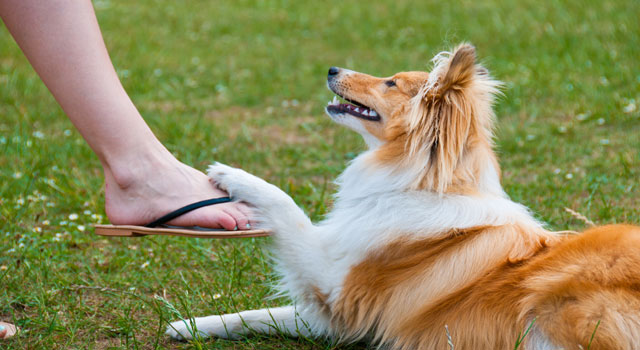Are You Struggling With Dog Training? Let’s Chat
07/10/2022 - Blog
 Are you struggling with dog training? Don’t worry, you’re not the first pet parent to feel overwhelmed or frustrated. And you certainly won’t be the last. Helping your pet to negotiate the complexities of living with humans is something that would be an awful lot easier if they could talk. But they can’t. And that’s why dog trainers spend many a long hour studying canine behaviour and learning how dogs think - because if you can understand how a dog’s brain works, you can find a way to help to live their best life alongside their human family.
Are you struggling with dog training? Don’t worry, you’re not the first pet parent to feel overwhelmed or frustrated. And you certainly won’t be the last. Helping your pet to negotiate the complexities of living with humans is something that would be an awful lot easier if they could talk. But they can’t. And that’s why dog trainers spend many a long hour studying canine behaviour and learning how dogs think - because if you can understand how a dog’s brain works, you can find a way to help to live their best life alongside their human family.
In my career as a dog trainer and dog behaviourist, I’ve met countless dog owners. Some (in fact most) have come along to puppy and dog life skills classes specifically because they wanted to avoid their pets growing up to become pests. However, no two dog are the same. And no two families are the same either. Sometimes we need to adjust our techniques a little to fit the pet’s personalities.
I could write an endlessly long list of things that make people feel they are struggling with dog training. Here are just a few.
- The dog doesn’t ‘listen’ to people
- Dog is physically very strong and can easy override it’s handler
- Life is too busy to fit dog training into the daily routine
- Friends and family let the dog get away with ‘naughty’ stuff and so training is undone
- Other people sabotage training by approaching your pet when he or she is in training
- Fido behaves beautifully at home but forgets his training when out and about
My Dog Doesn’t Listen To Me
If I have a pound for every time somebody said ‘my dog doesn’t listen’ to me, I’d be writing this from my private yacht in the middle of the mediterranean.
If your pet seems to ignore your requests - whether they are voice cues or hand signals. Ask yourself why. Can they hear you? Do they understand what you are asking? Are they distracted?
Hearing Problems
You may laugh, but my first port of call for any long term dog training conundrums is a vet visit. Perhaps your dog is ignoring you because he or she genuinely can’t hear you. Do they react to noises other than your voice? Can they hear high pitched sounds better than lower tones?
Response To Name
Does your dog actually know you are talking to them? Perhaps your voice just sounds like background noise. This is especially relevant to puppies or rescue dogs who don’t know their name and haven’t had much training.
Put yourself in their paws for a moment - imagine you are on holiday somewhere that you don’t understand the language and other people don’t understand what you are saying either. How do you know if somebody is asking you to move out of their way, come and fill in a form, choose from the menu or any other commonly asked question? If they are looking directly at you or tapping you on the shoulder, that’s a strong clue. Teach your dog his or her name so that they at least know you are addressing them.
No Strong Incentive
Every time a dog sees, hears or smells something interesting, they have two choices. “Do I react, or do I carry on doing what I’m doing?” And I guess it’s the same for humans too.
If I heard a car driving past my house I would most likely ignore it —— it’s not particularly interesting. Should the car come scrunching up my drive, I would definitely take notice. The sound of wheels on gravel might mean a visitor or a delivery, in other words, there’s something in it for me. And potentially, that something is more interesting than what I’m doing right now.
When your dog hears a familiar word - for example ‘sit’ he or she has the choice of sitting down as requested, or blatantly ignoring the cue. If Fido’s brain has been conditioned to know that responding in a particular way to the word ‘sit’ means that good stuff is coming - well, then he’ll literally drop everything to do as he has been asked.
Before you panic - modern dog training uses treats and games to reward dogs in the early stages of their training. But once a behaviour has been established, you won’t need to hand out lumps of cheese every time the dog does something right. Once those neural pathways are in place, behaviours become almost automatic. That’s why we use reward based training.
Help! My Dog Is Too Strong
No dog needs to be enormous to be physically quite powerful. That’s why you sometimes see quite athletic looking dog owners being dragged along by small dogs. But then you’ve probably also seen enormous dogs being walked by people who don’t look like weightlifters. It’s all down to training. Even if your dog has already developed bad habits, a good dog trainer will be able to show you techniques so that you can train your pet to walk nicely on the lead and to have lovely manners.
Reward based dog training uses brain power to teach pets that they don’t need to get physical in order to make good stuff happen (or to make bad stuff go away). Going right back to basics and starting the training from scratch will be like a brain re-boot. They’ll discover that staying calm is the best way to live companionably alongside their human family.
For very strong, energetic dogs, I also recommend lots of enrichment activities to keep their brain busy and keep them calm. They tend to be much easier to handle when they’re not over-excited.
My Life Is Too Busy For Dog Training
Dog training is easy to work into your daily routine. You don’t need to put aside any particular time for it (although it helps if you can), but instead you can build it into your pet’s everyday life.
While you and your dog are out for a walk, take the opportunity to practice recalls, sit-stays, loose lead walking, retrieves and hide and seek (aka scent work). You could teach your pet to sit at the kerb before crossing the road, and encourage him or her to focus on you instead of greeting every dog they see. Is there a coffee shop en route so that you can practise your dog’s ‘settle’? Maybe there’s a park or a dog walking field near you with agility equipment for your dog to try out?
In the home, you can train your dog to respect rules and boundaries. For example, ask for a ‘sit’ and ‘wait’ before they dive into their dinner bowl. That impulse control will be invaluable in lots of situations. Teach your pet to go to their bed when the doorbell rings - that way they won’t jump all over visitors.
It doesn’t take long to make tiny tweaks in your activities to turn them from ‘something you do’ to a dog training opportunity.
I’m The Only One Who Trains The Dog
I feel your pain. And it’s a common gripe for anyone who is struggling with dog training. Because all of the humans react differently to different behaviours, the poor dog doesn’t know what’s wrong and what’s right.
For example, “Mum” asks the dog to stay in his bed while she prepares dinner, but when “Dad” makes a sandwich at lunchtime, he hand feeds Fido with delicious cheesy offcuts. Or the adults who live in the house stop their dog jumping up because they don’t want the children to get knocked over, but Grandma comes round and lets Fido jump all over her because “he loves his Granny”
I can’t stress enough how important it is that BEFORE your dog arrives, you decide as a family what’s acceptable behaviour from your pet. And then EVERYONE must stick to the rules and use the same training techniques. When training your dog, consistency is key. Even if that does mean ‘having a word’ with Granny and risking hurt her feelings. Trust me, she’ll get over a bit of hurt pride, much quicker than she’ll recover from being knocked over when that cute little puppy grows into a 30Kg furry cannonball.
Outside of the home it’s not always easy to ask strangers to give your dog some space. Have a good think and practice a few phrases that you can call upon when you need to. For example “Please don’t fuss him until he’s sitting down, I have an elderly parent and I don’t want him to think it’s OK to jump up”
One of the pet parents who brings her dog to lifeskill classes at CK9 Training confessed that she has muzzle trained her pet. Not because she feels he might bite or fight, but because if she is out on a training walk and doesn’t want to be disturbed, she can be pretty confident that no one will approach a dog wearing a muzzle. They’ll usually round their dogs up and put them on a lead too. It’s cheeky but it works.
“He Does It Beautifully At Home”
It’s incredible isn’t it, how just when you think your pet has really ‘learned’ something, they go ahead and forget all about it when they’re in the park. Part of dog training is what we call, proofing a behaviour. In other words, making sure that any training cue gets the same response no matter what’s going on all around.
I want to take you back to earlier in the article, when we talked about dogs choosing whether to listen to their handler or to carry on with what they were doing. Dogs are sentient beings, they’re very capable of weighing up their options and choosing the one they think will guarantee them the biggest reward. We need them to decide that listening to their owner will mean that good stuff is definitely coming their way, whereas chasing that squirrel is a bit of a gamble in terms of a dopamine hit.
If you are struggling with dog training in different environments, my tip is to go right back to basics. Don’t expect your pet to walk around the park glued to your heel because that’s what he does in your living room. The park has a million times more distractions than home. Go back to basics. Take your pet to the park and start the training from the very beginning, just as you did in your living room. Use high value treats - it’s going to be hard for them to focus and boring old kibble won’t hold their interest. Give them tiny pieces of cooked chicken instead and reward them frequently to begin with. Finally, end the lesson on a high. Stop training while they’re doing well so that they don’t get the chance to discover that ignoring you is actually more fun than listening to you.
Don’t Struggle Alone - Get Help
If you are struggling with dog training, whether it’s a playful pup who won’t listen or an older dog who has got into bad habits, don’t struggle alone. There’s plenty of help out there. You can join a dog training class, or you can book a 1-2-1 zoom session with a dog trainer who will help you discover tools and techniques to help you overcome your worries.
Talk to the team at CK9 Training who will help you find the right solution for your dog training struggles https://www.ck9training.co.uk/contact
Find out what your dog’s body language is telling you https://www.ck9training.co.uk/blog/what-does-your-dogs-behaviour-mean/









